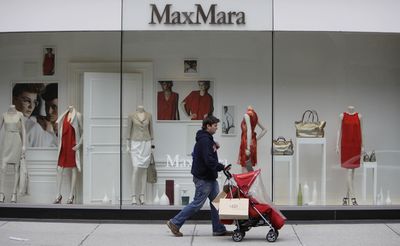Consumer confidence grows
Monthly uptick exceeded economists’ forecasts

NEW YORK – Consumer confidence zoomed past economists’ forecasts in April to its highest level since November, reflecting a growing sense that the economy may have bottomed out and Americans might be prepared to spend more money.
The findings released Tuesday offered hope that families could open their wallets after months of austerity, but experts cautioned that shoppers were unlikely to splurge while layoffs are still looming.
“When people feel better, they increase their spending,” said Gary Thayer, chief economist at Wachovia Securities. But while people are spending a little more freely on everyday items, he said, they are “cautious and holding back on expensive items.”
“We will probably see consumers save a little more and hold back on spending until the job market starts to improve,” he said.
Economists noted that the overall increase in confidence was due in part to the recent stock market rally, and they still do not expect consumer sentiment to return to healthy levels this year. Still, they saw the 12-point jump – the biggest gain since November 2005, when the economy was recovering from Hurricanes Katrina and Rita – as significant.
“Recent signals of stabilization or improvement in the economy have been relatively weak and dispersed,” said Brian Bethune, chief U.S. Financial Economist at IHS Global Insight, in a note released to investors Tuesday. “This is the first signal that actually showed a significant upward quantum leap.”
Positive signals from the housing and financial markets add further evidence that a trough in the economy is “more clearly on the radar screen,” Bethune added. But he does not expect the economy to bottom out until September or October.
A housing index released Tuesday showed that home prices dropped sharply in February, but for the first time in 25 months the decline was not a record – another sign the crisis could be easing. The Standard & Poor’s/Case-Shiller index showed prices in 20 major cities tumbled by 18.6 percent from February 2008. That was slightly better than January’s 19 percent.
The Dow Jones industrial average slipped 8.05, or 0.1 percent, to 8,016.95 after being down as much as 86 points in the hours ahead of the consumer confidence report, according to preliminary calculations.
The Consumer Confidence Index, measured by the Conference Board, soared to 39.2 from a revised 26.9 in March. That is the highest reading since November’s 44.7 and far surpasses economists’ expectations for 29.5.
The results come from responses received through April 21 of a representative sample of 5,000 U.S. households.
April’s huge jump follows a small increase in March and a fall in February. Still, the index remains well below year-ago levels of 62.8.
The survey showed a substantial improvement in consumers’ short-term outlook, including their assessment of the job market.
There are plenty of economic challenges remaining. Economists expect the rate of decline for U.S. economic activity to slow to 5 percent when the government releases its initial estimates for the first quarter Wednesday. That would be an improvement from the 6.3 percent rate seen in the fourth quarter.